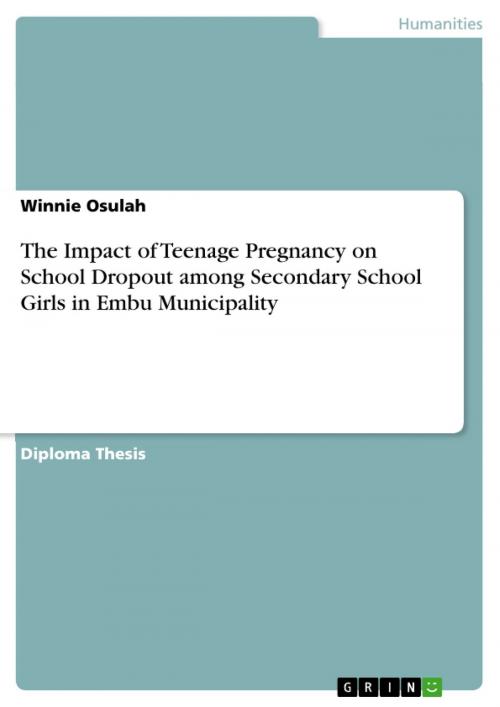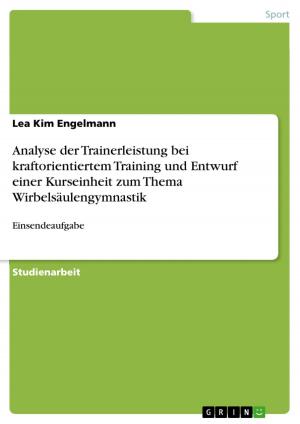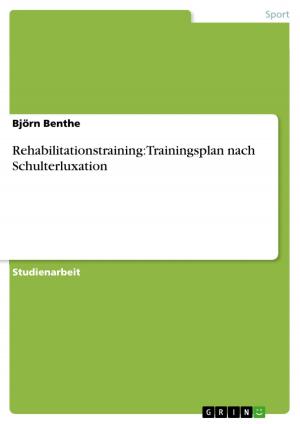The Impact of Teenage Pregnancy on School Dropout among Secondary School Girls in Embu Municipality
Nonfiction, Social & Cultural Studies, Social Science, Sociology| Author: | Winnie Osulah | ISBN: | 9783656323280 |
| Publisher: | GRIN Verlag | Publication: | November 28, 2012 |
| Imprint: | GRIN Verlag | Language: | English |
| Author: | Winnie Osulah |
| ISBN: | 9783656323280 |
| Publisher: | GRIN Verlag |
| Publication: | November 28, 2012 |
| Imprint: | GRIN Verlag |
| Language: | English |
Diploma Thesis from the year 2007 in the subject Sociology - Children and Youth, , course: Diploma in Social Work, language: English, abstract: Although considerable attention has been paid to the prevalence of adolescence childbearing in Kenya today, few studies have focused on the educational consequences of the schoolgirl pregnancy. Using data collected in selected schools in Embu Municipality, this study examines the factors associated with schoolgirl pregnancy as well as the likelihood of school dropout and subsequent re-enrollment of schoolgirls who become pregnant. The analysis is derived from the data collected from secondary schoolgirls, education officials and teachers on factors that predispose girls to pregnancy, the extent to which teenage pregnancy contributes to school dropout and the eventual levels of re-admission. The data analysis shows that girls in secondary schools are actually already sexually active though they lack the relevant information to help them make the right choices as far as their sexuality is concerned. The little information that they have is not conclusive and it is evident that they yearn for information which would be useful for them. Policy on re-admission has been formulated but the extent to which it is applied is still a questionable issue. A lot of gaps also exist in record keeping of the girls who become pregnant while in school and what becomes of them when they dropout. Such records would be vital in determining for sure if these girls become pregnant before dropping out of school or otherwise and subsequently tracking them down for re-admission purposes. A question is then raised on what other factors would be causing these girls to drop out of school other than just the pregnancy. However, poverty, cultural practices and peer pressure are among the factors assumed to be predisposing girls to pregnancy from the findings of this study, while these factors in themselves would also cause dropouts. Given the increasing levels of female school participation in Kenya today through the affirmative action motion targeting the girl child, the findings of this study suggest that future studies will benefit from exploring the causal relationships between the factors mentioned above, adolescent reproductive health behavior and subsequent school attendance.
Diploma Thesis from the year 2007 in the subject Sociology - Children and Youth, , course: Diploma in Social Work, language: English, abstract: Although considerable attention has been paid to the prevalence of adolescence childbearing in Kenya today, few studies have focused on the educational consequences of the schoolgirl pregnancy. Using data collected in selected schools in Embu Municipality, this study examines the factors associated with schoolgirl pregnancy as well as the likelihood of school dropout and subsequent re-enrollment of schoolgirls who become pregnant. The analysis is derived from the data collected from secondary schoolgirls, education officials and teachers on factors that predispose girls to pregnancy, the extent to which teenage pregnancy contributes to school dropout and the eventual levels of re-admission. The data analysis shows that girls in secondary schools are actually already sexually active though they lack the relevant information to help them make the right choices as far as their sexuality is concerned. The little information that they have is not conclusive and it is evident that they yearn for information which would be useful for them. Policy on re-admission has been formulated but the extent to which it is applied is still a questionable issue. A lot of gaps also exist in record keeping of the girls who become pregnant while in school and what becomes of them when they dropout. Such records would be vital in determining for sure if these girls become pregnant before dropping out of school or otherwise and subsequently tracking them down for re-admission purposes. A question is then raised on what other factors would be causing these girls to drop out of school other than just the pregnancy. However, poverty, cultural practices and peer pressure are among the factors assumed to be predisposing girls to pregnancy from the findings of this study, while these factors in themselves would also cause dropouts. Given the increasing levels of female school participation in Kenya today through the affirmative action motion targeting the girl child, the findings of this study suggest that future studies will benefit from exploring the causal relationships between the factors mentioned above, adolescent reproductive health behavior and subsequent school attendance.















